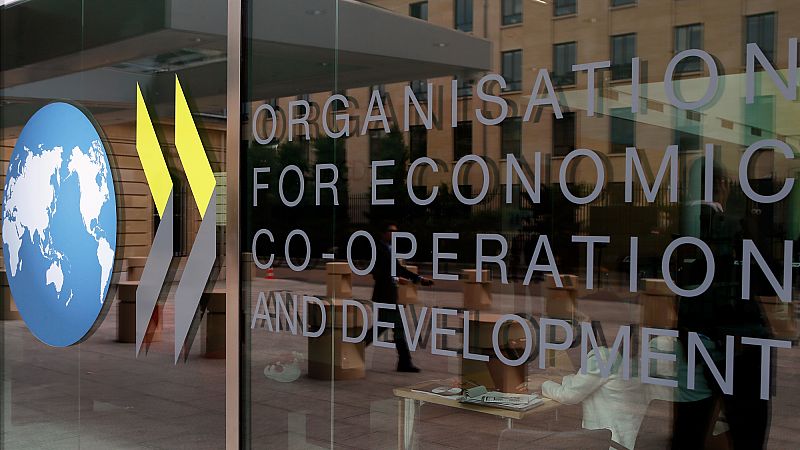
The worldwide economic forecast for 2025 is expected to remain highly unpredictable, as stated by the Organisation for Economic Cooperation and Development (OECD).
This can largely be attributed to escalating trade tensions, declining consumer and business confidence, as well as stricter financial environments. Heightened policy unpredictability, notably with regards to U.S.-imposed tariffs, is anticipated to significantly influence the worldwide economy and exacerbate inflation rates.
The global GDP is anticipated to fall behind in 2025.
The OECD anticipates global gross domestic product (GDP) will decelerate to 2.9% in 2025, down from an expected 3.3% in 2024, provided that present tariffs continue unchanged through mid-May. This projection marks a decline compared to their earlier prediction of 3.1%. Regarding 2026, the organization forecasts world GDP growth at 2.9%, which is lower than their prior estimation of 3%.
Nations like Italy, Norway, France, Mexico, and Germany might experience minimal economic expansion in 2025, whereas Costa Rica, Denmark, Ireland, Poland, and Israel are anticipated to witness robust growth during the same period.
In response to the OECD’s latest prediction, Russ Mould, who serves as the investment director at AJ Bell, stated in an emailed message to Axofa: "The adjustment is minor—downgrading expectations from 3.1% to 2.9% for 2025—but it may prompt some reflection among investors reviewing their early-morning updates. This downward revision has had a dampening effect on the mining industry since markets worry it might signal lower commodity demand, potentially leading to decreased prices for various metals and minerals."
The 90-day truce on tariffs is set to expire in slightly more than a month, putting pressure on nations to strike agreements with the Trump administration. According to reports, Trump desires top proposals for trade talks by this coming Wednesday, possibly to prevent any hasty decisions or deadlocks.
In 2025, the OECD forecasts global production to reach 2.6%, while the U.S. anticipates only slight expansion at 1.1%.
Inflation expectations in 2025
The OECD forecasts that inflation across member countries will reach 4.2% in 2025, marking an increase from their previous prediction of 3.7% made in December. Likewise, they anticipate inflation to rise to 3.2% in 2026, reflecting an upward revision from their initial projection of 2.9%.
Turkey is anticipated to lead with the highest inflation rate of 31.4% in 2025, followed closely by Colombia, Chile, Poland, Estonia, and Hungary, all of which are projected to maintain elevated price levels.
Nevertheless, Switzerland, Finland, France, Sweden, and Costa Rica are anticipated to experience comparatively lower inflation rates in 2025.
The anticipated inflation rate for G20 nations in 2025 is set at 3.6%, which is projected to decline slightly to 3.2% in 2026.
In what ways can policymakers stimulate economic expansion?
The OECD recommends that policymakers strive to decrease trade barriers to foster economic development and seek more cooperative approaches to worldwide trade and political matters, rather than resorting to tariffs.
Initiatives aimed at improving supply chain efficiency, along with expanding the network of buyers and sellers for businesses, might significantly contribute to reaching these objectives. Additionally, adopting harmonized regulatory standards could help mitigate cross-border regulatory hurdles.
Regarding monetary policy, the OECD recommends that central banks should concentrate on reducing inflation, but they should ease interest rates carefully in nations where a decrease in inflation is anticipated.
The OECD further suggests fostering a more consistent and sustainable climate for business investments, particularly by decreasing policy unpredictability. This might involve implementing measures to enhance competition, eliminating entry obstacles, and supporting entrepreneurial activities. Additionally, the OECD advocates simplifying access to financing options.
